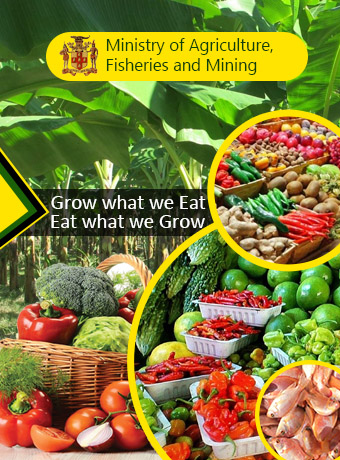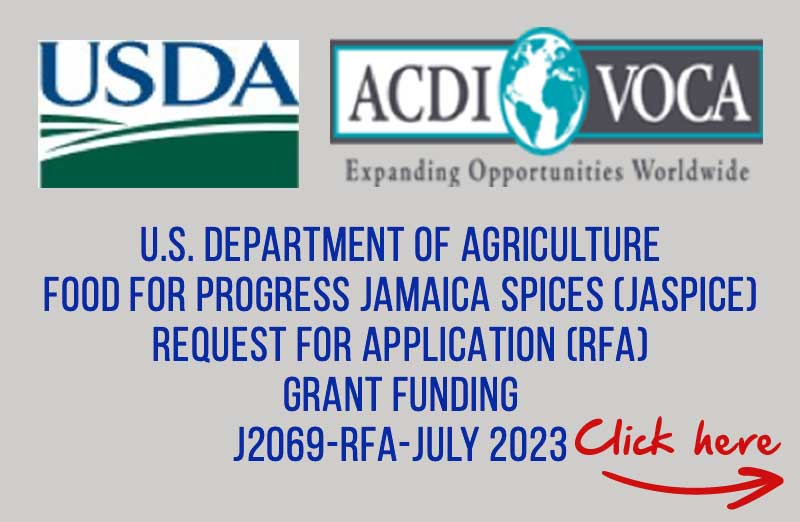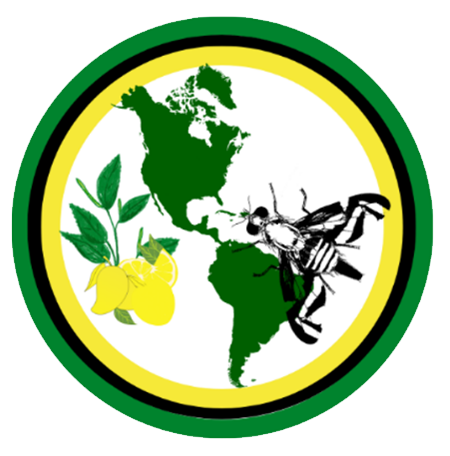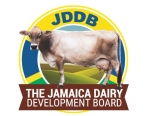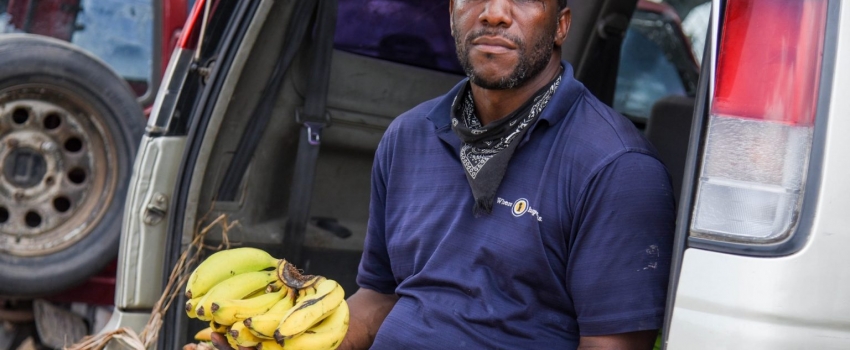
Farmer from Brandon Hill, in St. Andrew, Kevin McLaren, displays ripe bananas and a breadfruit from his farm, during a Farmers’ Market on July 3, at the Ministry of Industry, Commerce, Agriculture and Fisheries playfield, in St. Andrew.
The Government is making significant investments in the agricultural sector to safeguard the country’s food security and accelerate the sector’s recovery from the economic fallout induced by the coronavirus (COVID-19) pandemic.
With the temporary closure of the tourism sector in March, an unprecedented situation was created in which significant quantities of fresh and perishable local agricultural produce, originally destined for the sector, suddenly had no market.
The situation was further exacerbated by quarantine lockdowns and restrictions of movement that resulted in gluts in community markets.
The Ministry of Industry, Commerce, Agriculture and Fisheries responded immediately by initiating a produce ‘buy-back’ programme to assist in the movement of the excess produce from farmers to consumers.
Initially, an allocation of $200 million was provided for the sector, through the Ministry of Finance, to which the Ministry added another $40 million, amounting to a total of $240 million, which was made available for the buy-back programme.
The money provided stimulation in the sector for continued agricultural production, securing the livelihoods of more than 30,000 farmers, by purchasing and distributing the excess produce across the island.
The Rural Agricultural Development Authority (RADA) has been working in collaboration with produce purveyors to ramp up marketing and distribution of excess supplies of produce, through the establishment of mobile food markets, farmers’ markets, online sales and delivery of care packages and produce in the food industry.
State Minister in the Ministry of Industry, Commerce, Agriculture and Fisheries, Hon. Floyd Green, tells JIS News that the Ministry’s buy-back initiative is an innovative response to distributing excess produce.
“The initial response to COVID was $240 million in the surplus package and that was really to do an excess buy-back programme. A lot of our farmers had a significant downturn in their markets, because of the fallout in the tourism industry,” the State Minister points out.
“A lot of crops were specifically grown for the hotel industry. Things like yellow squash, eggplant and zucchini you don’t normally see them forming part of the regular market basket. We decided to channel all of that, plus an additional $40 million from our budget for this year, into that buy-back programme,” he explains.
As an immediate response to the crisis, the Ministry has been purchasing, transporting and distributing excess produce valued at $120 million. The Ministry also facilitated a $6.6-million egg subsidy.
For the agro-processing sector, allocations of $4 million and $2.5 million will be put towards the provision of storage for pork, and increased administrative support.
Additionally, $52 million has been allocated to production incentive. This includes the distribution of fertiliser, seeds and chemicals, while approximately $9 million has been allocated for the provision of personal protective equipment (PPE) and sanitising agents.
Notably, the Ministry had coordinated the redistribution of produce valued at $12.6 million, donated by farmers to quarantined communities in Bull Bay, Clarendon and St. Mary, through the Ministry of Labour and Social Security.
As part of drought mitigation measures, the Ministry has provided $24 million to facilitate trucking of water by the National Irrigation Commission (NIC), with another $194 million in mitigation support to come.
“We have to supply the immediate needs of persons who want to plant and who already have crops in the ground, so we have started trucking to some of those parishes that have been hardest hit – St. Elizabeth, Manchester, St. Mary and Portland,” Mr. Green tells JIS News.
As it concerns production levels, the Ministry is collaborating with input suppliers to ensure the consistent availability of seeds, fertilisers and pesticides to enable continued cultivation and production.
To ensure the country’s food security, the Government has increased its support of the agricultural sector’s COVID-19 response with an allocation of $1 billion, through the Ministry of Finance, to provide additional support to farmers and fisherfolk to stimulate recovery and growth for the sector during the 2020/2021 financial year.
This allocation will support the provision of equipment and machinery, such as tractors, bulldozers, backhoes and drones; infrastructure, such as greenhouses, post-harvest packing houses, shade houses and nurseries.
The funds will also be used to provide assistance to the livestock subsector, including poultry, pigs and small ruminants. Also, the allocation is to provide assistance to the Fisheries industry to include fingerlings, feed, fishing equipment and gear as well as refrigerated containers for storage.
Mr. Green says the procurement of refrigerated storage facilities is critical at this time.
“This COVID crisis has shown us that we have a deficiency in storage capacity. We believe that we need to strengthen the Government’s storage capacity, especially in these times. If we were able to store [produce], then there would not be any gluts in the market, spoilage or wastage,” he notes.
The allocation will make provision for the support for climate-smart production practices and technologies, including water and irrigation equipment, catchment areas and ponds, drainage and a seed bank programme.
Furthermore, the disbursement will support incentives for production to include purchase of excess produce from farmers, land preparation, seeds and other planting material, pest and disease management and soil analyses.
The Ministry is giving the assurance that the production of agricultural supplies is now under way, the trade in goods is adequate and there are sufficient food items and other goods to supply the domestic market as well as to provide for the demand from the tourism and hospitality sectors as they reopen.
Several members of the agricultural sector have commended the Government for the measures being employed to assist farmers in the recovery process.
President of the Jamaica Egg Farmers’ Association and Chief Executive Officer, National Eggs, Roy Baker, tells JIS News that the Government’s support of the industry has assisted in providing viable markets for produce.
“Initially, we ran into an excess of inventory because of the lockdown of the tourism industry. We approached the Ministry and had dialogue about how we could tackle the problem, and with their support in the form of a subsidy in sales, we were able to drop the price to a very attractive point, which we consider as very strategic, because it is encouraging more persons to use the product,” Mr. Baker says.
“We in the Egg Farmers’ Association are very happy for the effort and it has been helping farmers tremendously,” he adds.
Farmer from Brandon Hill in St. Andrew, Kevin McLaren, says he is particularly pleased with the buy-back programme.
“It will help the farmers to reduce the stock that they have. Markets in town not really saying anything right now. It is easier for RADA to take it from us to distribute it to other entities who want to buy it. That is very good,” he says.
Mr. McLaren produces a variety of food items, including coconut, breadfruit, pineapple, banana and plantain.
Source: JIS
